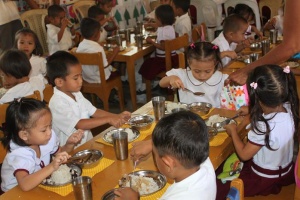
To address malnutrition and improve the health of young Filipino children, the Department of Social Welfare and Development (DSWD) continues to implement community-based feeding programs in partnership with local government units (LGUs).
Close to 4 million children have benefitted from the Department’s Supplementary Feeding Program (SFP) from 2021 up to June 30, 2023.
The DSWD promotes and implements the SFP as part of the agency’s contribution to the government’s Early Childhood Care and Development (ECCD) Program, and in line with Republic Act No. 11037 or the “Masustansyang Pagkain para sa Batang Pilipino Act.”
The continuing implementation of the SFP was also one of the directives of President Ferdinand R. Marcos, Jr in his first SONA in 2022 to ensure the well-being of children.
“As the marching order of the President, the DSWD will ensure that children will continue to enjoy the benefits of nutritious food under the SFP by regularly securing funding for its implementation. This is anchored on the President’s vision of a hunger-free Philippines by 2027,” DSWD Secretary Rex Gatchalian said.
The SFP provides food in addition to the regular meals of children currently enrolled in LGU-managed Day Care Centers and Supervised Neighborhood Play.
The types of meals usually served to children beneficiaries use indigenous foods and/or locally produced foods equivalent to 1/3 of Recommended Energy and Nutrient Intake (RENI).
For the 11th Cycle of SFP implemented in school year 2021 to 2022, close to 2 million children (1,993,377 children) were served with nutritious meals surpassing the annual target by 2.9 percent.
For the 12th Cycle of the program, which started in August 2022, some 1,855,954 children were served as of June 2023.
Aside from SFP, the DSWD also implements the Bangsamoro Umpungan sa Nutrisyon (BangUN) Project to combat malnutrition among children and provide health support to pregnant and nursing women in the Bangsamoro Autonomous Region in Muslim Mindanao (BARMM).
In 2022, the BangUN Project served 18,657 children and 3,343 pregnant and nursing women.
The DSWD, as the chair of the Inter-Agency Task Force on Zero Hunger (IATF-ZH), will continue to collaborate with concerned agencies, LGUs, and development partners to address hunger, ensure food security, and decrease stunting of poor Filipino children as part of the goal of the Marcos administration. #


